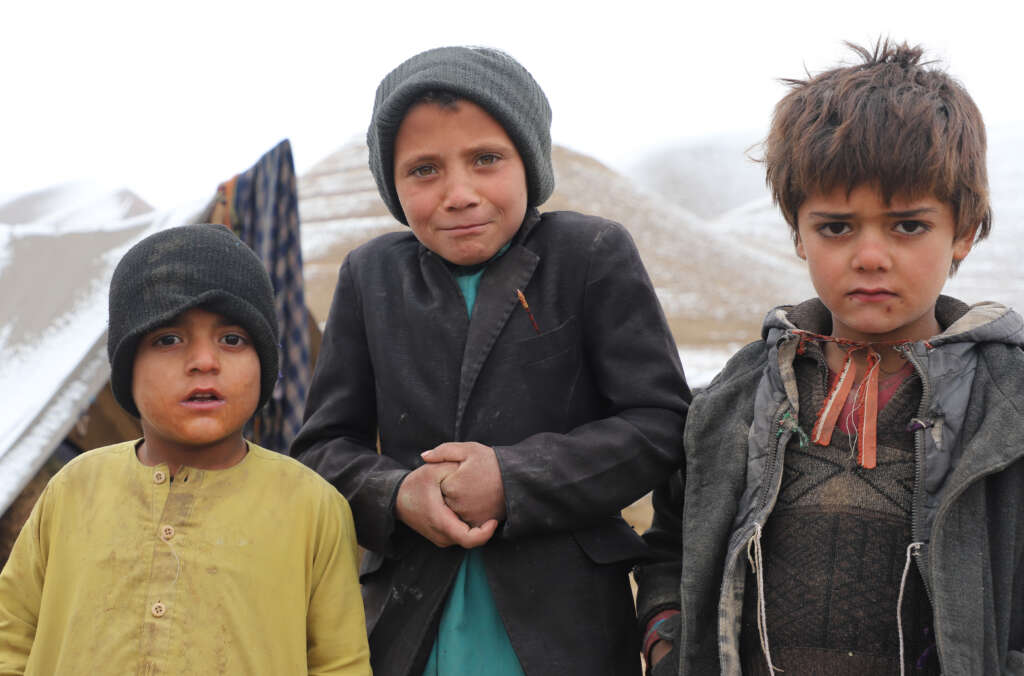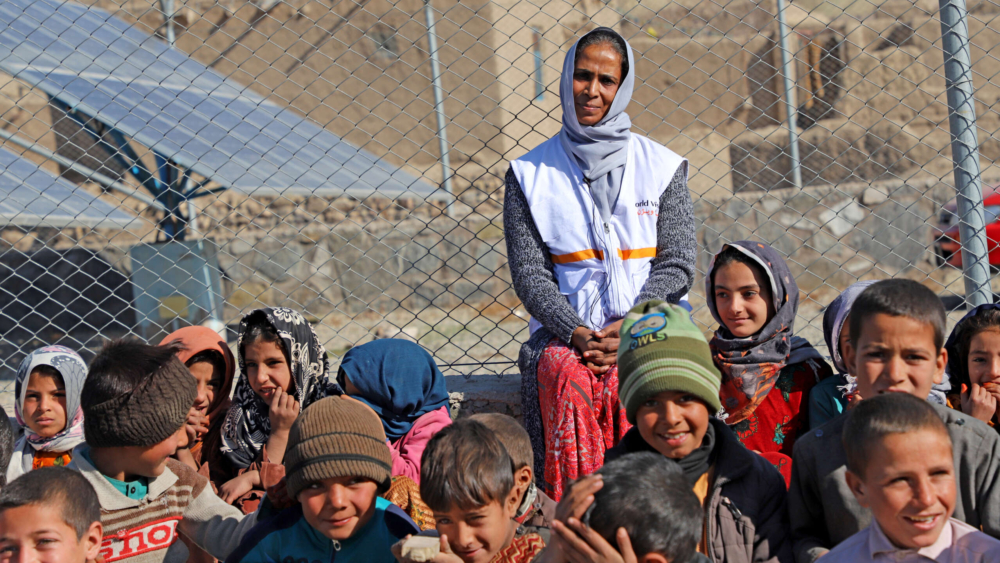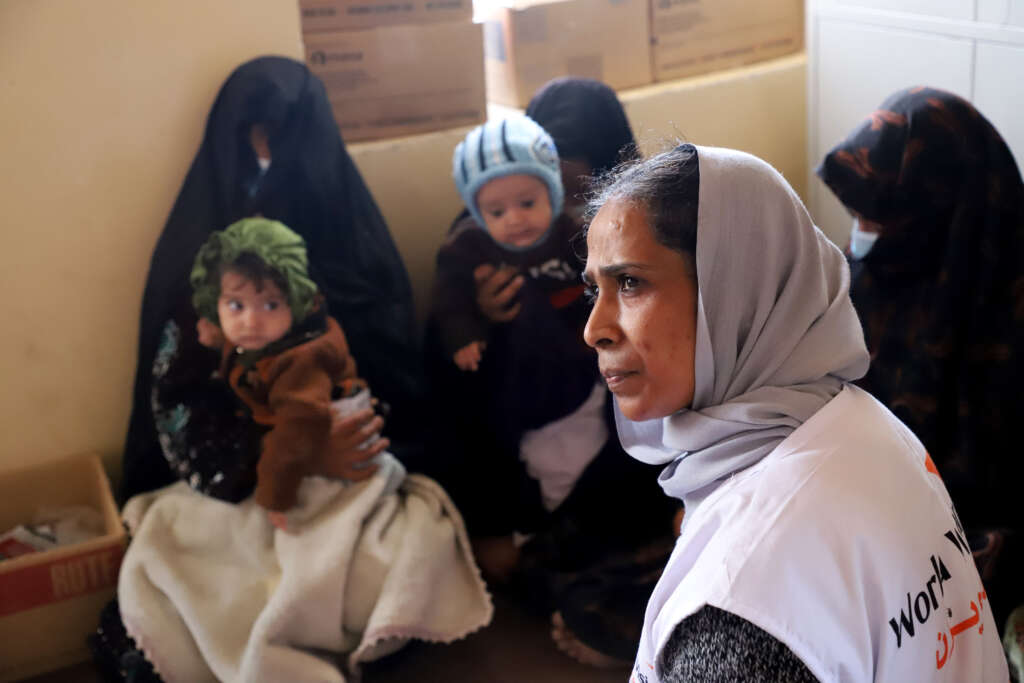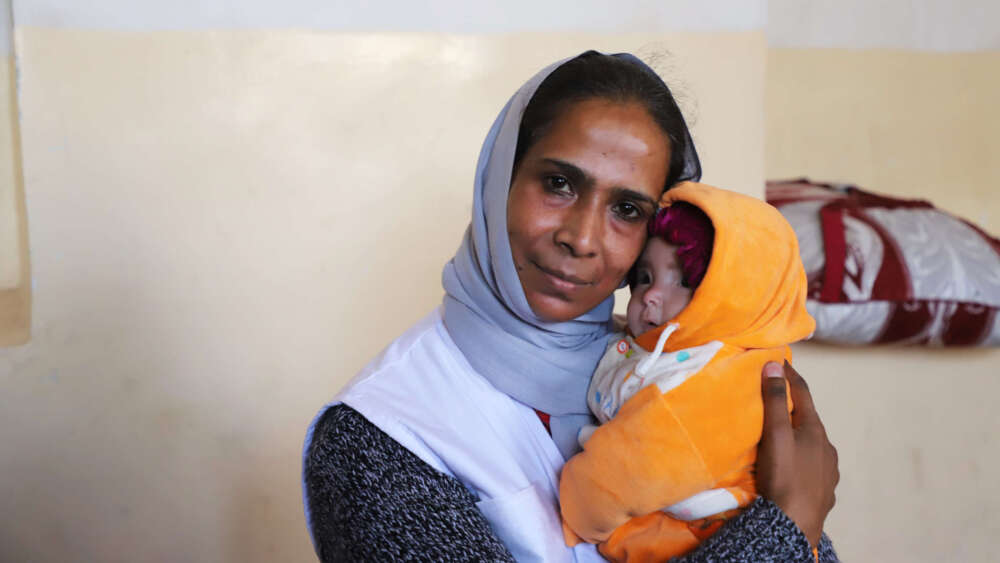In her years as director of three aid organisations in Afghanistan, Asuntha Charles has grown into an inspirational, tough-as-nails leader who refuses to be stressed by the challenges facing her but to see beyond them to the solutions.
This explains why, when the National Director of World Vision in Afghanistan spoke to supporters in Sydney, her theme was: “Finding hope through the eyes of a child in Afghanistan.”
But to find that hope, she says, the global community must act to alleviate the bleak facts of life for children in Afghanistan now. As winter approaches, 1.1 million children are on the verge of dying from malnutrition and 95 per cent of people are skipping one or two meals every day. Children are losing their dreams as boys become sole breadwinners for their families and girls wake every day in fear of being sold in marriage because they cannot go to school and prepare for a different future.
“Can we look at those faces and see whether we can make our Christmas season more meaningful.” – Asuntha Charles
“I want to share the reality, and it’s not the numbers. People may be hearing the numbers, but for me, what is important is the human face behind those numbers. And we have to tell them the real stories. It may be very, very gloomy, but that is how the situation is,” Asuntha tells Eternity.
“That’s why this Christmas season is so crucial for me to be in Australia, to connect how much the personal can reflect what’s happening in Afghanistan. With the cold winter, Afghanistan’s children will die if there’s no attention. So can we look at those faces and see whether we can make our Christmas season more meaningful in this context?”

Displaced children and their families live under tents in winter without facilities in Badghis, Afghanistan.
Asuntha tells Eternity the heartbreaking plight of a boy she met last time she was in the field. His father had died in the conflict, and his mother was unable to work because of restrictions the Taliban have imposed on women. He has seven brothers, a sister and a grandmother so he has to work to feed a family of ten.
“He carries the luggage for people who are travelling between Herat, which is a western province where World Vision operates, to the Iran border because it shares a border with Iran,” she explains.
“For a week, he earns less than $10, and he has to feed the entire family with that money. I asked the boy, ‘What was your dream like? What did you want to become?’ He was telling me when he was growing up, he saw the doctors with white coats and decided he could become a doctor.”
Attaining his dream would have allowed him to treat his sick grandmother and other people in the village at no cost when there was no money for doctors. “Today, those dreams are collapsing. And I don’t think children have the right to lose their dreams. When I look at such stories, it frustrates me to see, ‘What are we going to do? How are we going to keep these dreams alive?’”

World Vision Afghanistan National Director Asuntha Charles visits World Vision’s Health & Nutrition program in Herat province, where children are suffering from hunger because of drought. World Vision
Asuntha is passionate about giving hope and a future to children beyond the humanitarian support World Aid can provide.
The Indian-born activist turned humanitarian leader bravely decided to stay on in Afghanistan when many humanitarian leaders fled with the return of the Taliban.
“As you know, we stayed back even throughout the most challenging period in the country. I was inside the country, so we communicated to the people that we would not leave them when there was a huge need,” she explains.
“So we started implementing our programs around food distribution, cash for work programs; we had several community mobile health clinics in all the four provinces that we work, and we have started Water, Sanitation and Hygiene (WASH) programs where we want to ensure that children have clean drinking water, so the families are not walking 5-10km for water. We also have huge protection programs for children so that they are protected from all kinds of negative coping mechanisms and also community-based schooling for children. In the past year, we reached out to 1.4 million people, out of which 500,000 are children.
“But we need to do much more than that. We are not doing sufficient. For me, the future is fast approaching. I don’t want any more children to die in Afghanistan this winter. Today parents have to choose whether to heat the family home or to eat something. Children shouldn’t be making those difficult choices. As a global community, we have a responsibility to give hope to the children, to tell them that ‘We are with you and we will support you to have a future.’ That’s where I see we can do much more than what we are doing now.”
“We need long-term development programs to increase employment opportunities so that families become self-dependent and live a life of dignity.” – Asuntha Charles
Unfortunately, she says, humanitarian programs are insufficient to bring about the long-term changes needed to restore lives of dignity.
“Given the UN sanctions, we can only implement humanitarian programs. And we need long-term development programs to increase employment opportunities so that families become self-dependent and live a life of dignity,” she says.
“As for my dream for Afghanistan, nobody should have to be dependent on external aid. And this is possible if we can promote sustainable solutions for the communities. This is my constant request to the donors – let us think about stronger development intervention. Let us not stop at humanitarian aid, and this is highly crucial now.”
Asuntha says World Vision Afghanistan is developing a new strategy to reach at least 2.1 million people in the next three years.
“Mostly, we want to see that we can create opportunities for people to revive agriculture, so that will help them to produce food rather than bringing food into the country. We want to explore alternative ways of promoting education for children, which is crucial for their future. And also continue to be with them and give them more hope through our presence and also continue to advocate and bring their voices to the external world. Boldly speaking about the problems in Afghanistan and how much you need to be there to support them.”

Asuntha Charles visits World Vision’s Health & Nutrition program in Herat province.
Surprisingly, Asuntha says she has found it an advantage being a woman under the new regime.
“On the whole, I see this as a positive thing of communicating to the de facto authorities that female leadership exists. I have seen my presence in advocating for the rights of girls and women as a positive thing, and that’s what I feel is my strength. My voice becomes much more powerful because I am a woman and I come from an Asian culture, so people also easily associate with me because I’m not from the West, so I share most of the traditions of the country. So in that way, I can easily connect, and people can also connect with me closely,” she says.
From the outset, Asuntha made it clear that “a woman heads World Vision, so they need to have conversations with me. I have no compromises that I’m going to be hiding my face.
“Actually, they were appreciative because I stayed back in the country and that gave me more power and strength to say, ‘Okay, women are stronger [than you think].’ That sent a lot of positive signals and was helpful for me to go and talk to them about certain humanitarian principles. So I thought the risk that I took was worthwhile.”
Asuntha says she is passionate about Afghanistan because it was there she came to develop her power as a woman.
“This country has always faced challenges, but I see that those challenges have moulded me to be what I am today because I see myself as a completely different person from 2009. I’ve grown in authority, and I’m so passionate about Afghanistan [people] because they have contributed a lot to what I am today.
“Today, when I look back, I’ve become a more positive person. I have emerged as a leader who looks beyond challenges. Today I look for solutions.”
“I’ve grown in authority, and I’m so passionate about Afghanistan [people] because they have contributed a lot to what I am today.” – Asuntha Charles
Asked what role her faith has played in this process, Asuntha says she sees herself as like the prophet Samuel, who surrendered himself to God’s leading
“When I started my career, I remembered the beautiful song where God asked Samuel, ‘Whom should I send?’ And Samuel spontaneously says, ‘Here I am, Lord.” So I think, without knowing, I chose to go to Afghanistan when Oxfam asked me without knowing what the country looked like.
“But that surrender has helped me to take God as my complete leader, and today I realise all that I have achieved is just because I surrendered myself as an instrument, and he has been moulding me. He has been guiding me. And today, I realise this is much more than a career option for me. It’s much more a calling to serve the most vulnerable. So that gives me a lot of joy.”
What are the most helpful ways Australians can respond to your message today?
“I know Australians are worried that funds will be diverted to the de facto authorities or the Taliban. Some organisations remain transparent and accountable and make sure the money sent by every person is used properly and World Vision can be considered one of those.
Give: As we are in the Christmas season, people will spend extra for food at our parties, but can we think about those children who do not even have a single meal? Can you spare something, given the food that you’re going to eat could support one child in Afghanistan and that will make a huge difference?
Pray: When you start praying, you cannot stop sharing. Prayer and sharing go together. So my sincere request is, can we be instruments of sharing God’s love and compassion with the people who deserve the most? Can we see Christ in those suffering children who are shivering in the winter?”
You can help children in Afghanistan by donating to World Vision Australia’s Child Hunger appeal here.
Email This Story
Why not send this to a friend?


